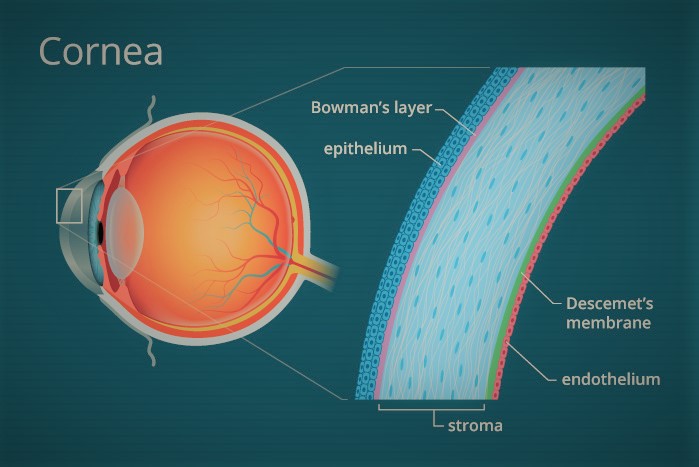Cornea

About the Cornea
The Cornea is an important structure of the eye that functions in a number of ways to help provide clear vision. First, it acts as the clear outermost lens of the eye that allows light rays to pass through to the Retina. Normally it is about the size and thickness of a dime and is curved in a dome like shape.
It is critical for the Cornea to maintain its transparency and optical clarity as well as its regular curvature and thickness in order to function properly.
When light strikes the cornea, it bends or refracts the incoming light onto the Crystalline Lens of the eye. The Crystalline Lens further focuses that light onto the Retina, a layer of light sensing cells lining the back of the eye.
For one to see clearly, light rays must be focused by the Cornea and Crystalline Lens to fall precisely on the Retina. The Retina takes that light energy, and makes it something the brain interprets as vision.
The Cornea also serves as a filter, screening out some of the most damaging ultraviolet (UV) wavelengths in sunlight. Without this protection, the Lens and the Retina would be highly susceptible to injury from UV radiation. Last, the Cornea serves to protect the internal structures of the eye by shielding it from easy penetration of microorganisms, dust and debris.
There are a number of eye diseases, conditions or problems that can affect the functioning of the cornea and thus your ability to see clearly. These can include:
- eye injuries
- eye infections
- inherited familial or genetic conditions,
- aging changes.
It is often possible to treat these conditions with eye drops or other medications, various types of surgery or contact lenses.
In the event the cornea is badly compromised and non-surgical options do not help to improve vision, it may be necessary to have a Corneal Transplant.
Early Diagnosis and Treatment Is Essential:
As you can see, there are many conditions that can affect the cornea. We at Sai Varnha Eye Hospital can often treat most of these eye conditions and corneal diseases using non-surgical treatment options.
However if they are not diagnosed and treated early or if they progress to where vision is compromised beyond an acceptable level, it may be necessary for an ophthalmologist to perform a Corneal Transplant.